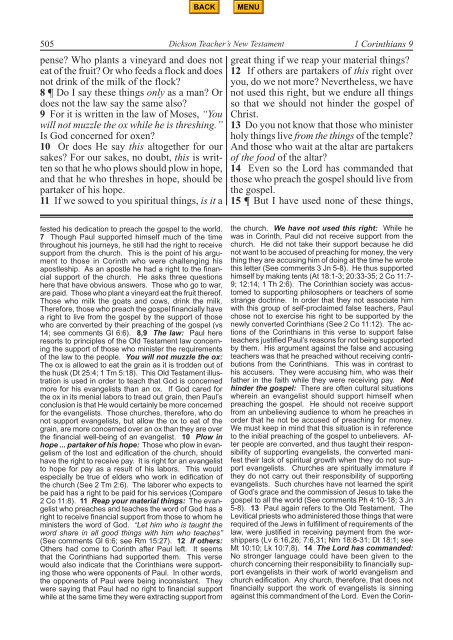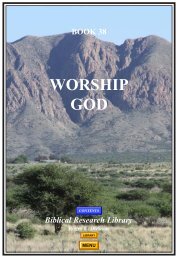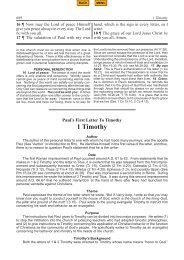1 Corinthians
1 Corinthians
1 Corinthians
Create successful ePaper yourself
Turn your PDF publications into a flip-book with our unique Google optimized e-Paper software.
505 Dickson Teacher’s New Testament<br />
the church. We have not used this right: While he<br />
was in Corinth, Paul did not receive support from the<br />
church. He did not take their support because he did<br />
not want to be accused of preaching for money, the very<br />
thing they are accusing him of doing at the time he wrote<br />
this letter (See comments 3 Jn 5-8). He thus supported<br />
himself by making tents (At 18:1-3; 20:33-35; 2 Co 11:7-<br />
9; 12:14; 1 Th 2:6). The Corinthian society was accustomed<br />
to supporting philosophers or teachers of some<br />
strange doctrine. In order that they not associate him<br />
with this group of self-proclaimed false teachers, Paul<br />
chose not to exercise his right to be supported by the<br />
newly converted <strong>Corinthians</strong> (See 2 Co 11:12). The actions<br />
of the <strong>Corinthians</strong> in this verse to support false<br />
teachers justified Paul’s reasons for not being supported<br />
by them. His argument against the false and accusing<br />
teachers was that he preached without receiving contributions<br />
from the <strong>Corinthians</strong>. This was in contrast to<br />
his accusers. They were accusing him, who was their<br />
father in the faith while they were receiving pay. Not<br />
hinder the gospel: There are often cultural situations<br />
wherein an evangelist should support himself when<br />
preaching the gospel. He should not receive support<br />
from an unbelieving audience to whom he preaches in<br />
order that he not be accused of preaching for money.<br />
We must keep in mind that this situation is in reference<br />
to the initial preaching of the gospel to unbelievers. After<br />
people are converted, and thus taught their responsibility<br />
of supporting evangelists, the converted manifest<br />
their lack of spiritual growth when they do not support<br />
evangelists. Churches are spiritually immature if<br />
they do not carry out their responsibility of supporting<br />
evangelists. Such churches have not learned the spirit<br />
of God’s grace and the commission of Jesus to take the<br />
gospel to all the world (See comments Ph 4:10-18; 3 Jn<br />
5-8). 13 Paul again refers to the Old Testament. The<br />
Levitical priests who administered those things that were<br />
required of the Jews in fulfillment of requirements of the<br />
law, were justified in receiving payment from the worshippers<br />
(Lv 6:16,26; 7:6,31; Nm 18:8-31; Dt 18:1; see<br />
Mt 10:10; Lk 10:7,8). 14 The Lord has commanded:<br />
No stronger language could have been given to the<br />
church concerning their responsibility to financially support<br />
evangelists in their work of world evangelism and<br />
church edification. Any church, therefore, that does not<br />
financially support the work of evangelists is sinning<br />
against this commandment of the Lord. Even the Corinpense<br />
Who plants a vineyard and does not<br />
eat of the fruit Or who feeds a flock and does<br />
not drink of the milk of the flock<br />
8 Do I say these things only as a man Or<br />
does not the law say the same also<br />
9 For it is written in the law of Moses, “You<br />
will not muzzle the ox while he is threshing.”<br />
Is God concerned for oxen<br />
10 Or does He say this altogether for our<br />
sakes For our sakes, no doubt, this is written<br />
so that he who plows should plow in hope,<br />
and that he who threshes in hope, should be<br />
partaker of his hope.<br />
11 If we sowed to you spiritual things, is it a<br />
1 <strong>Corinthians</strong> 9<br />
great thing if we reap your material things<br />
12 If others are partakers of this right over<br />
you, do we not more Nevertheless, we have<br />
not used this right, but we endure all things<br />
so that we should not hinder the gospel of<br />
Christ.<br />
13 Do you not know that those who minister<br />
holy things live from the things of the temple<br />
And those who wait at the altar are partakers<br />
of the food of the altar<br />
14 Even so the Lord has commanded that<br />
those who preach the gospel should live from<br />
the gospel.<br />
15 But I have used none of these things,<br />
fested his dedication to preach the gospel to the world.<br />
7 Though Paul supported himself much of the time<br />
throughout his journeys, he still had the right to receive<br />
support from the church. This is the point of his argument<br />
to those in Corinth who were challenging his<br />
apostleship. As an apostle he had a right to the financial<br />
support of the church. He asks three questions<br />
here that have obvious answers. Those who go to war,<br />
are paid. Those who plant a vineyard eat the fruit thereof.<br />
Those who milk the goats and cows, drink the milk.<br />
Therefore, those who preach the gospel financially have<br />
a right to live from the gospel by the support of those<br />
who are converted by their preaching of the gospel (vs<br />
14; see comments Gl 6:6). 8,9 The law: Paul here<br />
resorts to principles of the Old Testament law concerning<br />
the support of those who minister the requirements<br />
of the law to the people. You will not muzzle the ox:<br />
The ox is allowed to eat the grain as it is trodden out of<br />
the husk (Dt 25:4; 1 Tm 5:18). This Old Testament illustration<br />
is used in order to teach that God is concerned<br />
more for his evangelists than an ox. If God cared for<br />
the ox in its menial labors to tread out grain, then Paul’s<br />
conclusion is that He would certainly be more concerned<br />
for the evangelists. Those churches, therefore, who do<br />
not support evangelists, but allow the ox to eat of the<br />
grain, are more concerned over an ox than they are over<br />
the financial well-being of an evangelist. 10 Plow in<br />
hope ... partaker of his hope: Those who plow in evangelism<br />
of the lost and edification of the church, should<br />
have the right to receive pay. It is right for an evangelist<br />
to hope for pay as a result of his labors. This would<br />
especially be true of elders who work in edification of<br />
the church (See 2 Tm 2:6). The laborer who expects to<br />
be paid has a right to be paid for his services (Compare<br />
2 Co 11:8). 11 Reap your material things: The evangelist<br />
who preaches and teaches the word of God has a<br />
right to receive financial support from those to whom he<br />
ministers the word of God. “Let him who is taught the<br />
word share in all good things with him who teaches”<br />
(See comments Gl 6:6; see Rm 15:27). 12 If others:<br />
Others had come to Corinth after Paul left. It seems<br />
that the <strong>Corinthians</strong> had supported them. This verse<br />
would also indicate that the <strong>Corinthians</strong> were supporting<br />
those who were opponents of Paul. In other words,<br />
the opponents of Paul were being inconsistent. They<br />
were saying that Paul had no right to financial support<br />
while at the same time they were extracting support from









